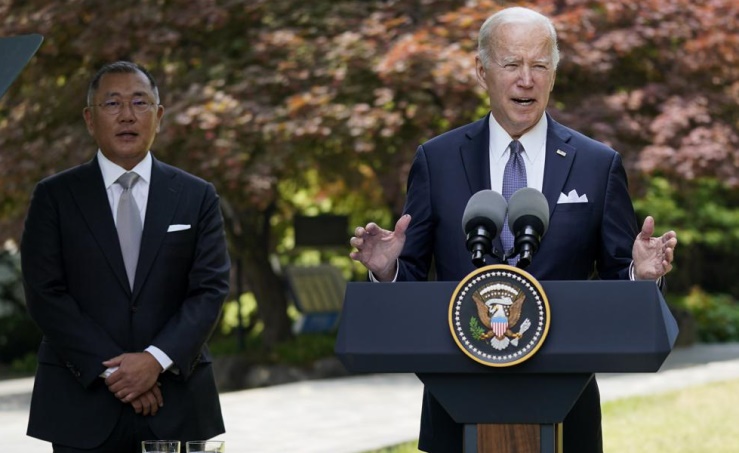
President Joe Biden tended to both business and security interests Sunday as he wrapped up a three-day visit to South Korea, showcasing Hyundai’s pledge to invest at least $10 billion in electric vehicles and related technologies in the United States.
Before leaving South Korea and heading to Japan, Biden appeared with Hyundai chief executive Eusiun Chung to highlight the company’s expanded investment in the United States, including $5.5 billion for an electric vehicle and battery factory in Georgia, The AP reported.
“Electric vehicles are good for our climate goals, but they’re also good for jobs,” Biden said. “And they’re good for business.”
Chung also said his company would spend another $5 billion on artificial intelligence for autonomous vehicles and other technologies.
The major U.S. investment by a South Korean company was a reflection of how the countries are leveraging their longstanding military ties into a broader economic partnership.
Earlier in his trip, Biden toured a computer chip plant run by Samsung, the Korean electronics giant that plans to build a $17 billion production facility in Texas.
Biden has made greater economic cooperation with South Korea a priority, saying on Saturday that “it will bring our two countries even closer together, cooperating even more closely than we already do, and help strengthen our supply chains, secure them against shocks and give our economies a competitive edge.”
Hyundai’s Georgia factory is expected to employ 8,100 workers and produce up to 300,000 vehicles annually, with plans for construction to begin early next year and production to start in 2025 near the unincorporated town of Ellabell.
But the Hyundai plant shows that there are also tradeoffs as Biden pursues his economic agenda.
The president earlier in his term tried to link the production of electric vehicles to automakers with unionized workers. As part of a $1.85 trillion spending proposal that stalled in the Senate, Biden wanted extra tax credits to go to the buyers of EVs made by unionized factories. That would have provided a boost to the unionized auto plant owned by General Motors Co., Ford Motor Co. and Stellantis NV at a vital moment when union membership nationwide has been steadily decreasing.
F.K.N.












